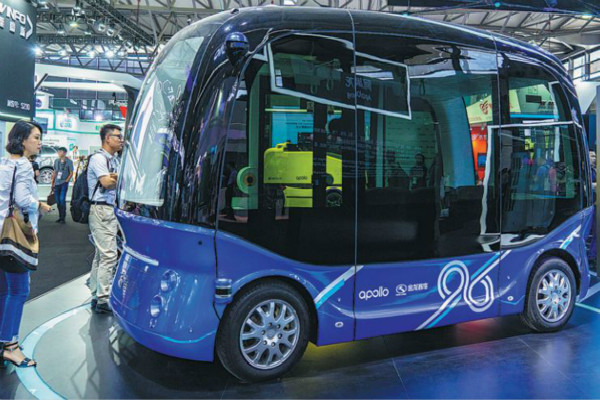 |
|
A Baidu Apollo bus is displayed at the CES Asia 2018 in Shanghai. [Photo provided to China Daily] |
Daimler AG is furthering its partnership with China's internet giant Baidu Inc in automated driving and connected vehicles, consolidating their cooperation in aspects that are believed to be the future of the automotive industry.
The two will strengthen their collaboration through Baidu's Apollo open platform and will explore new fields in vehicle connectivity services, according to their memorandum of understanding made public last week.
Among other goals, they will diversify automated driving scenarios on both public roads and dedicated proving grounds, with safety as their primary concern.
The two also intend to integrate Baidu connectivity services into the Mercedes-Benz User Experience, the German carmaker's intelligent infotainment system.
Dieter Zetsche, chairman of Daimler AG and head of Mercedes-Benz Cars, said the automaker has been implementing its CASE strategy, which stands for connectivity, automated driving, sharing/services and electrification, both globally and at a local level in China.
"In particular, automated driving and connectivity are progressing at an unprecedented rate in China, and our continued success depends not only on staying ahead of these trends but on leading them."
Daimler was one of the first partners to join Apollo, an open autonomous driving platform Baidu launched in April 2017, which provides a comprehensive all-in-one solution that supports major features and functions of an automated vehicle.
In December 2017, Daimler became a member of the Apollo committee, which is dedicated to accelerating research on safer automated driving solutions in China and promoting relevant legislation.
Baidu Chairman and CEO Robin Li said the automotive industry in the era of artificial intelligence and big data will evolve from vertical integration to a platform-based ecosystem, and now is the best time for global automakers and tech companies to work together and deepen cooperation in building an intelligent ecosystem.
Their cooperation has yielded some fruits. With additional technical applications from Baidu's Apollo, Daimler became the first international automaker in July to receive a road test license for highly automated driving vehicles in Beijing, marking a major new milestone in the company's local research and development efforts in China.
Hubertus Troska, the board member of Daimler AG, responsible for Greater China, said realizing local automated driving and connectivity services requires understanding of the many characteristics that make the Chinese market unique.
"With the Apollo platform supporting our road tests in Beijing, our cooperation on automated driving allows us to create solutions that address China's specific conditions.
"Side by side with strong local partners, we will continue to strive for products and services that aim to best fit the needs of our customers in China," Troska said.
Daimler is one of many international carmakers testing autonomous driving in China, the world's largest car market.
In May, BMW AG won the first license among international carmakers to road test automated vehicles in Shanghai.
The licenses allow it to use a 5.6 kilometers section of public road in Shanghai's Jiading district to test smart cars.
BMW has set up a strong local team in Shanghai, including over 60 experts in autonomous driving.
Using the license, the team will gather data based on actual traffic, covering its full complexity.
This data will be used to train machine learning algorithms performing adequate L4 autonomous driving behavior, according to BMW.
lifusheng@chinadaily.com.cn